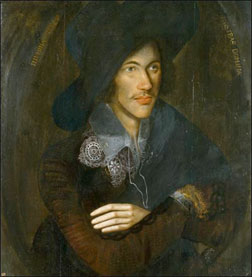Nearer, My God, to Thee
When poets get intimate with a higher power.

Complaining or even disputing with the gods, or with a particular god, in an intimate manner is ancient. The custom feels long-established even in the Homeric epics. Odysseus "spoke his mind to Calypso" in E.V. Rieu's prose translation of the Odyssey. "Goddess," he says to her, "you can take it from me that I shall not entrust myself to a boat, unless I can count on your goodwill. Could you bring yourself, goddess, to give me your solemn oath that you will not plot somehow mischief against me?"
This resembles domestic sparring: In a tactful, testing way, he is conveying that he doesn't quite trust her. What is the goddess up to? Of course, he and she have been sleeping together for some time, and that must be taken into account. Comparable encounters in the Bible include Jonah's reluctance to be a prophet and Jacob wrestling with an angel: narratives of conflict that in a quite different way suggest a countervailing intimacy along with awe.
Intimacy tempers awe in a sonnet by John Donne (1572-1631), too. In an apparently logical, somewhat lawyerly opening argument, with its energetic triple ifs, Donne puts aside his sense of awe, allowing it to reappear only in his ninth line ("But who am I, that dare dispute with thee/ O God?"), a little bit as though he has only just recalled it, interrupting his own eloquent, logic-chopping arguments and rhetorical questions:
If poisonous minerals, and if that tree,
Whose fruit threw death on else immortal us,
If lecherous goats, if serpents envious
Cannot be damned, alas, why should I be?
Why should intent or reason, born in me,
Make sins, else equal, in me more heinous?
And mercy being easy, and glorious
To God; in his stern wrath why threatens he?
But who am I, that dare dispute with thee,
O God? Oh! of thine only worthy blood,
And my tears, make a heavenly Lethean flood,
And drown in it my sin's black memory.
That thou remember them, some claim as debt;
I think it mercy, if thou wilt forget.
….….….….................….….—John Donne
Click the arrow on the audio player below to hear Robert Pinsky read John Donne's sonnet. You can also download the recording or subscribe to Slate's Poetry Podcast on iTunes.
Donne is quoting Jeremiah 12 ("Righteous art thou, O Lord, when I complain to thee,/ Yet I would plead my case before thee"). Gerard Manley Hopkins (1844-89) uses the same biblical passage as the epigraph for a sonnet he wrote more than two centuries later. Hopkins begins in a place similar to Donne's ninth line. Donne resolves his poem with a brilliant, clinching apothegm of his couplet—a rhetorical and intellectual flourish characteristic of someone who also wrote great love poems and great sermons. In contrast, Hopkins, a Catholic convert and Jesuit, resolves his poem with something like the opposite: an ecstatic, attentive sensory engagement with the natural world—and a wounded, pleading recognition of his own personal difference from that world, a feeling of deprivation sharpened by sensory abundance.
Justus quidem tu es, Domine, si disputem tecum: verumtamen justa loquar ad te: Quare via impiorum prosperatur? &c.
Thou art indeed just, Lord, if I contend
With thee; but, sir, so what I plead is just.
Why do sinners' ways prosper? and why must
Disappointment all I endeavour end?
....Wert thou my enemy, O thou my friend,
How wouldst thou worse, I wonder, than thou dost
Defeat, thwart me? Oh, the sots and thralls of lust
Do in spare hours more thrive than I that spend,
Sir, life upon thy cause. See, banks and brakes
Now leavèd how thick! lacèd they are again
With fretty chervil, look, and fresh wind shakes
Them; birds build—but not I build; no, but strain,
Time's eunuch, and not breed one work that wakes.
Mine, O thou lord of life, send my roots rain.
….….…................….….….—Gerard Manley Hopkins
Click the arrow on the audio player below to hear Robert Pinsky read Gerard Manley Hopkins' sonnet. You can also download the recording or subscribe to Slate's Poetry Podcast on iTunes.
The action of Donne's poem is to meditate his way toward self-recognition: energetic logical argument leading, finally, beyond itself. Hopkins' poem similarly works toward his own nature and circumstances but comes to a quite different realization of those qualities: an attention to nature so acute that it hurts.
That formulation may be too pat or too neatly dual. I'll add a third poem, in part as a complicating or transforming element: "Yet Do I Marvel," by the American poet Countee Cullen (1903-46). Cullen's variation on Jeremiah's theme makes the self-recognition social and historical as well as personal, a reflection on race and racism in American culture. The poem—newly posted—appears along with a video and commentary on the Favorite Poem Project page, alphabetically listed in "The Videos."
Slate Poetry Editor Robert Pinsky will be joining in discussion of these sonnets by John Donne and Gerard Manley Hopkins this week. Post your questions and comments on the work, and he'll respond and participate. You can also browse "Fray" discussions of previous classic poems.
Like Slate on Facebook. Follow us on Twitter.